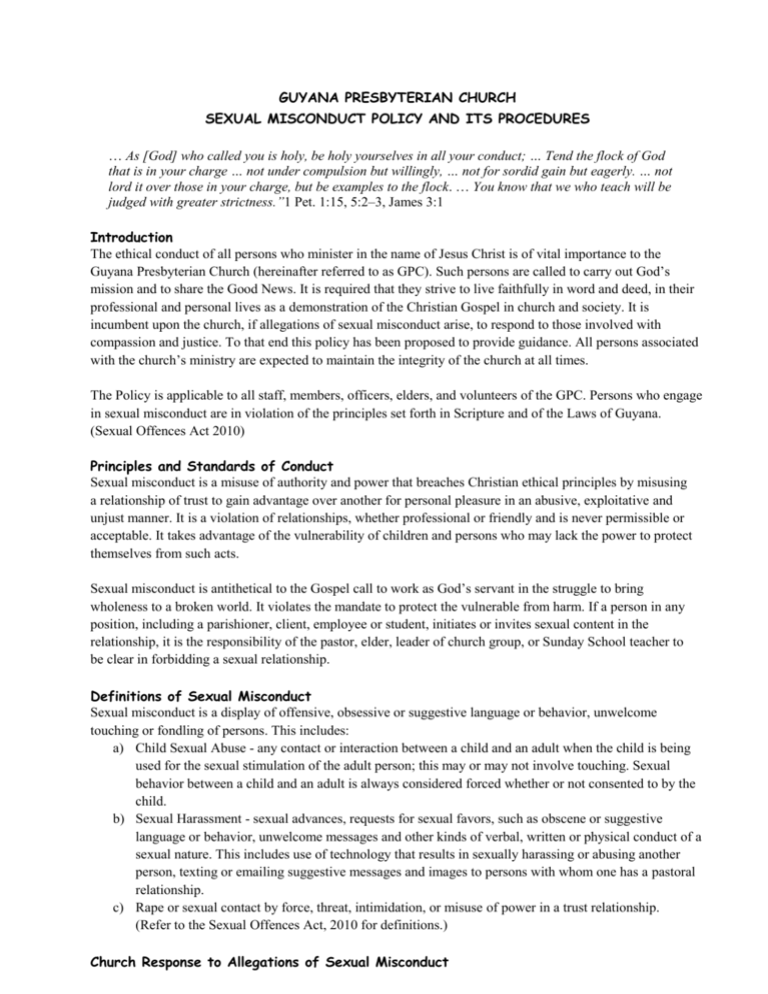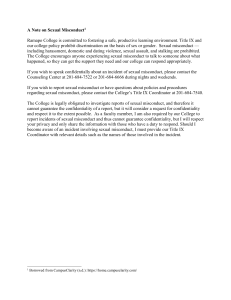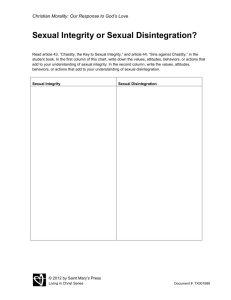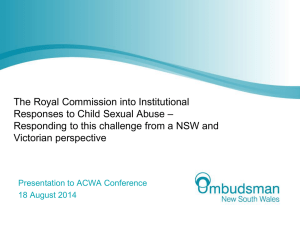
GUYANA PRESBYTERIAN CHURCH
SEXUAL MISCONDUCT POLICY AND ITS PROCEDURES
… As [God] who called you is holy, be holy yourselves in all your conduct; … Tend the flock of God
that is in your charge … not under compulsion but willingly, … not for sordid gain but eagerly. … not
lord it over those in your charge, but be examples to the flock. … You know that we who teach will be
judged with greater strictness.”1 Pet. 1:15, 5:2–3, James 3:1
Introduction
The ethical conduct of all persons who minister in the name of Jesus Christ is of vital importance to the
Guyana Presbyterian Church (hereinafter referred to as GPC). Such persons are called to carry out God’s
mission and to share the Good News. It is required that they strive to live faithfully in word and deed, in their
professional and personal lives as a demonstration of the Christian Gospel in church and society. It is
incumbent upon the church, if allegations of sexual misconduct arise, to respond to those involved with
compassion and justice. To that end this policy has been proposed to provide guidance. All persons associated
with the church’s ministry are expected to maintain the integrity of the church at all times.
The Policy is applicable to all staff, members, officers, elders, and volunteers of the GPC. Persons who engage
in sexual misconduct are in violation of the principles set forth in Scripture and of the Laws of Guyana.
(Sexual Offences Act 2010)
Principles and Standards of Conduct
Sexual misconduct is a misuse of authority and power that breaches Christian ethical principles by misusing
a relationship of trust to gain advantage over another for personal pleasure in an abusive, exploitative and
unjust manner. It is a violation of relationships, whether professional or friendly and is never permissible or
acceptable. It takes advantage of the vulnerability of children and persons who may lack the power to protect
themselves from such acts.
Sexual misconduct is antithetical to the Gospel call to work as God’s servant in the struggle to bring
wholeness to a broken world. It violates the mandate to protect the vulnerable from harm. If a person in any
position, including a parishioner, client, employee or student, initiates or invites sexual content in the
relationship, it is the responsibility of the pastor, elder, leader of church group, or Sunday School teacher to
be clear in forbidding a sexual relationship.
Definitions of Sexual Misconduct
Sexual misconduct is a display of offensive, obsessive or suggestive language or behavior, unwelcome
touching or fondling of persons. This includes:
a) Child Sexual Abuse - any contact or interaction between a child and an adult when the child is being
used for the sexual stimulation of the adult person; this may or may not involve touching. Sexual
behavior between a child and an adult is always considered forced whether or not consented to by the
child.
b) Sexual Harassment - sexual advances, requests for sexual favors, such as obscene or suggestive
language or behavior, unwelcome messages and other kinds of verbal, written or physical conduct of a
sexual nature. This includes use of technology that results in sexually harassing or abusing another
person, texting or emailing suggestive messages and images to persons with whom one has a pastoral
relationship.
c) Rape or sexual contact by force, threat, intimidation, or misuse of power in a trust relationship.
(Refer to the Sexual Offences Act, 2010 for definitions.)
Church Response to Allegations of Sexual Misconduct
Allegations of sexual misconduct are always considered allegations of offense against Scripture or the church
that trigger the disciplinary processes of the church set forth in the GPC Constitution, Article IX - Church
Discipline. (See Appendix I)
The Executive Committee of Synod may appoint a Committee or Commission to hear the allegations of sexual
misconduct. The Committee may also take measures to prevent future occurrences of harm through education
and policy.
In responding to allegations of sexual misconduct the following procedures must be followed:
a) Ministers, pastors, members, officers, and employees of the church should seek to uphold the dignity
of all persons involved, including persons who are alleging harm, persons who are accused of sexual
misconduct, and the families and communities of each. Such persons must be offered care and
counseling.
b) The matter must be reported to the Police or the Child Protection Agency (as is mandatory by law).
c) Where possible, the privacy of persons should be respected and confidentiality of communications
should be upheld.
d) The GPC has jurisdiction and responsibility over its ministers, elders, employees, members, and
volunteers such that if a member, or staff is alleged to have committed an offense against Scripture or
the GPC Constitution.
e) The church has the duty to follow due process and inquire into the allegations as outlined in the
Constitution of the Guyana Presbyterian Church.
f) Should the allegations be proven, the church has a responsibility to address the behavior of the person
and ensure the safety of others in the community.
Reporting Sexual Misconduct
Reports of allegations of sexual misconduct should never be taken lightly or disregarded and allowed to
circulate without concern for the integrity and reputation of the victim, the accused and the church. Reports of
allegations should be dealt with as matters of highest confidentiality, both before and after they have been
submitted to appropriate authorities as outlined below.
A person needing to report that a minister, pastor, member, officer, employee, or volunteer of the GPC has
committed sexual misconduct is encouraged to seek guidance from a GPC minister/pastor or may directly
approach the General Secretary or the Moderator as soon as possible.
The allegations may come from both members and non-members of the GPC. It is the duty of the person who
is the first contact of the church to ensure that it is appropriately reported to the designated personnel, also
keeping in mind the mandatory reporting requirements for Sexual Offences. The first person to learn of an
incident of sexual misconduct should not undertake an inquiry alone or question either the victim or the
accused unless the incident is divulged in the process of pastoral care and counseling. If the victim is hesitant
to talk to designated personnel, the person who has received the initial report has a special pastoral
responsibility to build trust and to demonstrate the importance of justice and healing. It is advisable that the
account of the statement be documented and dated by the person receiving the report and possibly the accuser
also.
(For due diligence guide and process see Appendix I, Article IX. CHURCH DISCIPLINE, Section 9.01)
Adopted by Synod, October 17, 2015, Burns Memorial Presbyterian Church








